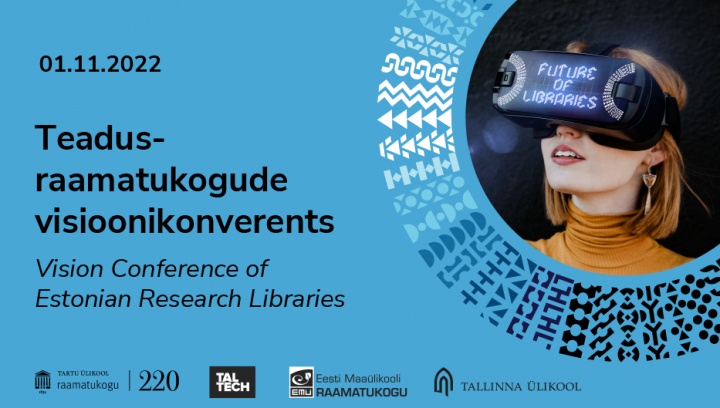Esimene teadusraamatukogude visioonikonverents Eestis
DOI:
https://doi.org/10.15157/tyrtar.v13i1.24229Abstract
The First Estonian Vision Conference of Research Libraries
On 1 November 2022, the first-ever vision conference dedicated to the future of research libraries was held in Estonia. The event marked the national year of libraries and the significant anniversary of the University of Tartu Library. Approximately 100 participants from various libraries, with 75 of them on-site and the rest online, engaged in discussions about the most critical issues in the development of research libraries and sought to set goals for the future.
The conference began with presentations in English, focusing mainly on open science. The first speaker was Ragnar Siil, founder and CEO of Creativity Lab, a think tank for international cultural policy and creative economy, and President of the European Network of Cultural Policy Designers. Rector of the University of Tartu Toomas Asser emphasised the vital role of libraries in a democratic society, noting that while university libraries have for centuries been responsible for preserving, managing, and providing access to research and cultural collections, the digital age has expanded their benefits and accessibility.
Eva Mendez, a renowned expert in open science, discussed the challenges in front of traditional scientific publishing practices, emphasising the „publish or perish” model and the need for open science to enhance the quality of research and global understanding. She highlighted the importance of flexibility in adapting to changing research practices, in leveraging contemporary technologies, and in amending intellectual property laws to better align with societal interests and scientific goals.
Kristjan Luukas Ilves, the Deputy Chancellor for Digital Development at the Ministry of Economic Affairs and Communications of the Republic of Estonia, stressed the significance of improving user experience, ensuring data quality and accessibility, and fostering the culture of open data. He underlined the importance of data security and the need for comprehensive data structures and technology and management skills development.
MIT Libraries’ experiences in the United States provided an example of effective change management. Erin Stalberg and Heather Sardis discussed MIT’s principles, emphasising the importance of the digital shift, open research, data management support, strategic human resource development, diversity, equity, and inclusion. They encouraged Estonian research libraries to develop strategies for change management.
MacKenzie Smith from the University of California, Davis, discussed the evolving role of research libraries.
While traditional libraries focused on their collections, today, the emphasis is on the user and their needs in a digital world. She suggested that research libraries should invest more in digital services, recruit IT experts, and utilise linked data. Smith also emphasised the growing importance of artificial intelligence and encouraged libraries to experiment with AI-based solutions.
In conclusion, the conference addressed three questions about the future of libraries: their names (with most favouring „libraries”, but also considering alternatives), required skills for librarians (with data management topping the list), and the possibility of conducting research without libraries (with responses divided between „yes” and „partly”).
The second part of the Vision Conference began with a presentation by Andres Kollist, the Director of Tallinn University Academic Library, discussing the understanding, ownership, value, and price of information in the context of the rapidly changing information landscape. He stressed the role of libraries in helping users assess, search, and find quality information in an environment often filled with information noise and misinformation.
Martin Eessalu, Head of a research infrastructure at the Ministry of Education and Research, provided an overview of the collaboration between the state and research libraries and outlined future perspectives. The Estonian Research and Development and Innovation Strategy „Research and Development and Innovation 2021–2035” prioritises the continuity of data archives, research libraries, and access to essential research databases. The government recognises the importance of making data and resources more accessible and promoting the open data culture.
Aija Sakova, an expert in literature and Manager of Business Cooperation and Knowledge Transfer at Tallinn University, discussed the seemingly contrasting roles of research libraries. She highlighted the library’s timeless role as a sanctuary for reflection and intellectual exploration, at the same time emphasising the need for libraries to evolve and become change agents in the data-driven world, supporting research data management, open science, and data literacy.
Tanel Alumäe, professor at the Tallinn University of Technology, presented the project „Estonian Text Summarizer”, focusing on text summarisation and computer-assisted navigation in large text corpora. Summarisation systems automatically generate concise summaries from extensive texts, making it easier to navigate and comprehend large volumes of text. He discussed the challenges and opportunities of developing such systems, highlighting the importance of training data, noise handling, and the potential of artificial intelligence in information retrieval.
Olga Einasto, Head of the Service Department at the University of Tartu Library, highlighted the importance of communication in libraries, tracing the evolution of communication processes in libraries from the Gutenberg era to the digital age. She emphasised that libraries have transformed from authoritative institutions to open and participatory learning environments, adapting to societal changes and realising the need for finding balance in their communication and power relationships with readers.
Liisi Lembinen, Director of Development at the University of Tartu Library and the main organiser of the conference, expressed her hope that the conference provided inspiration and a clearer vision of the expectations for research libraries and their future direction for all participants.
The conference aimed to benefit not only library professionals but also anyone interested in the future of research libraries. It addressed a wide range of topics, from the changing information landscape to the evolving role of libraries in the digital age, and the importance of open science and data management.
Downloads


